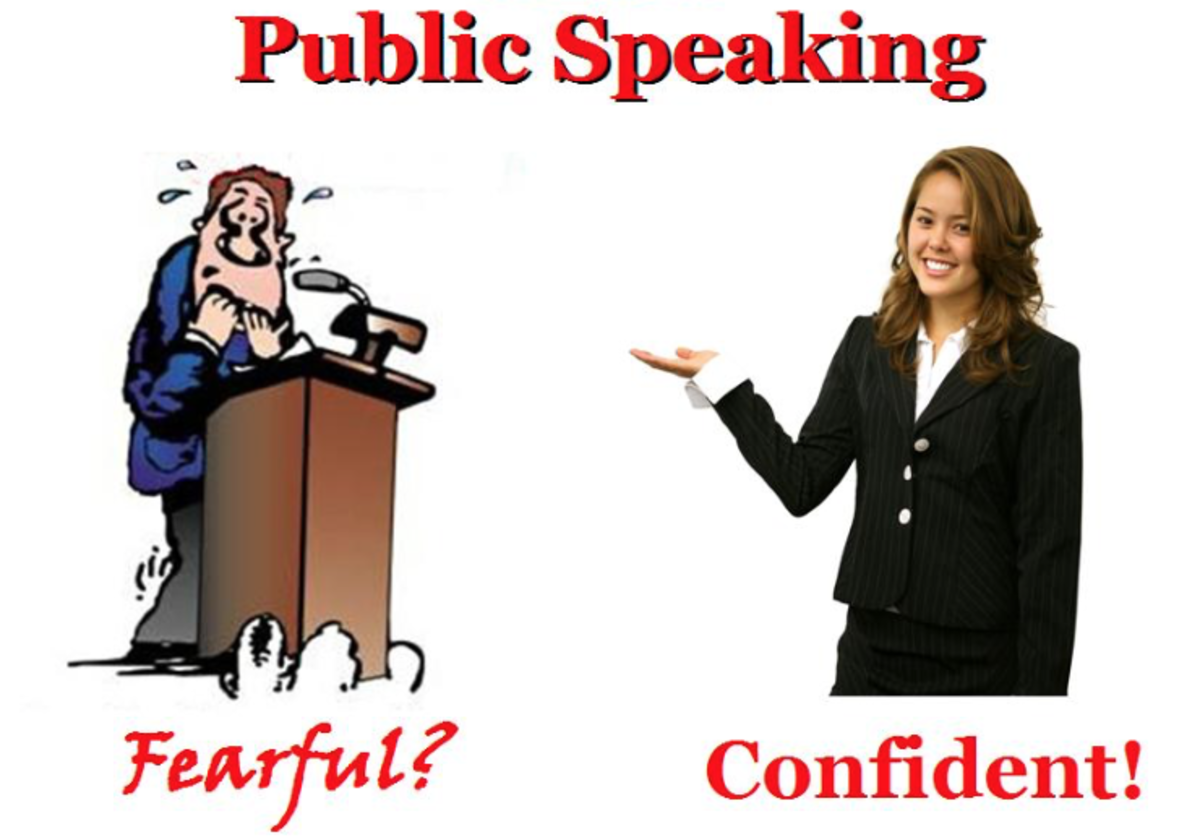How to win the hearts of audience with good speaking skills
Various adjectives define a human. One of them is "confidence".A person is usually confident when he/she has perfect command over a subject.
It could be any kind of subject, till a person feels that he/she has good knowledge about that area.However there are various instances where even when person knows lot of things, he is can't express them confidently in front of audience
The art of expressing one's knowledge in words is something that few persons have, few need to build them up.Not only "art of expression" but such kind of communication where listener understands what is being conveyed, is also very important
While giving speeches, sometimes speaker speaks his/her words, but its often misinterpreted by audience. In small level this doesn't matter much, but at upper level it matters a lot.A simple wrong word can harm many many lives.

Mistakes often done by speakers
Some of the most important mistakes made by leader while making mistakes are as follows:-
- Not able to relate with audience:-Judy Gould, a consultant to medical non-profits based in Albi, France, near Toulouse, recalls an American keynote speaker from a prestigious US university whose thoughts were roundly dismissed because she was out of touch with the European mentality.
- Gestures and words are not matching:-Think of the salute that US Secretary of State John Kerry gave when he came on stage to accept the Democratic nomination for president during the 2004 campaign. He raised his arm and said, "I'm John Kerry, and I'm reporting for duty." Franken observed: "Kerry looked stiff and people wondered if he really meant that in all seriousness."
- Invalid metaphors used while speaking:-When Chris Parry, formerly an officer with the Royal Navy, accepted a job as the chief executive of the Independent Schools Council in the UK, he soon found his former career seeping into his language when advocating school reforms. However, he soon found that military metaphors didn't go over too well with educators. Soon after a speech in 2008, he changed jobs.Parry’s main sin was of evoking the wrong metaphor. Professor Jonathan Charteris-Black, a linguist based in the UK, says metaphors work at a subconscious level to help people gain control over feelings of uncertainty that arise from change. But using the wrong one, or the wrong one for a particular audience, can wreak havoc.
- No Goal and no Script:-It was early in his career, and Macdonald was giving a seminar to employees at the Salvation Army in Los Angeles, California. He wore a microphone clipped to his tie and stood on a low stage close to the audience."I was talking about goals, and I couldn't figure out if I wanted to say, 'I want you to focus on your goals,' or 'I want you to first focus on your goals.' It came out, 'I want you to fart'," Macdonald said.

Best practice to be followed to become a good speaker
Few points that can help a person be confident and speak fluently before audience are listed below:-
- Hand and standing gestures:-While expressions of oneself in front of audience plays important role, so does our gestures , posture and pronunciations.Apart of communication, how we carry our self in entire session is another important aspect.One can say these go hand in hand.Together In trying to improve your own communication, beware of a defensive posture or negative voice inflection. Once a person goes on the defensive, the conversation tends to spiral into oblivion. Make sure that you use a friendly and welcoming posture, with open arms and a smile. If you sense yourself taking on defensive gestures or even resorting to a defensive tone (perhaps provoked by the other person) then eliminate those telling signs. Don’t let emotion overpower good judgment. In fact, the misreading of body language and tone of voice is one of the most common problems in the break down of communication. Even if you are saying something agreeable, if you show physical signs to the contrary, your message and your honesty will come under suspicion. Remember that negative and positive body language comes across in any language and in any circumstances.
- Set things straight:-Even when stumble, should have quality to get things right in middle of speech to maintain audience interest.Spontaneous speaking is an essential skill for leaders, managers and front line staff who want to engage their audiences.
Plan for any discussion, team meeting, talk or presentation that you are giving with these three ‘must dos':
- Find the right theme for your audience – find out about them so that you ‘communicate at their level’.
- Structure your plan so that you can deliver on that theme persuasively – understand the theme and how it adds value for them to gain their respect, trust and agreement.
- Adapt to listeners’ reactions as you speak – watch them, talk to them, not at them and make sure they understand.
- Dress Properly appropriately. So that audience's mind is directed on your speech instead of your clothes.
The clothing you wear can have an impact beyond the way you look standing in front of the room.
- Avoid noisy clothing or accessories. It’s not good if your shirt, pants, or jewellery distract your audience every time you move.
- Comfort is important too. Your energy level and delivery can be negatively impacted if you are wearing really uncomfortable clothing or shoes. This is especially important if you are speaking for a long keynote, or an all-day course. Pyjamas are not appropriate, but there is middle ground.
- Will you be wearing a microphone? If so, consider where it will be pinned.
- What gestures, actions, or props do you have planned? Will they work with what you are wearing?
- Before you get called up to speak, remove any potentially distracting items (e.g. ID badges, cell phones, sunglasses, hats)
- Eye contact to give each audience importance. And to make them feel that speaker is talking to them.Below are the areas , we have to consider while giving speech:-
- Staring: The possible problem area with eye contact is if you over do it and start to stare. Keep relaxed. Bare in mind you are building rapport and building a relationship, not trying to drill your message into their brains. When you build rapport you move in harmony with your audience and they will remember you and your message.
- Finding Frowns & Furrows: As a public speaker, there will be many times when you spot a frown or furrowed brow in your audience.
- Smile and move onto another more accepting face. Otherwise you may lose your concentration or energy trying to convince the owner of that face to be agreeable!
- Know that some audiences are more analytical, detailed information seekers and they show their thoughts.
- If you find the majority of your audience is frowning - YOU are the problem and you'll need to acknowledge this and make changes immediately!
- Being Brave Enough: Yes, making eye contact can be challenging - even with small audiences. We can feel exposed and vulnerable.
- Make session interactive. Ask some relevant questions, to which audience can relate easily Also with this audience will have interest in boring topics too.
- Lot of visuals and graphics to present things better.
- Reiterate all sessions speech before any of your friend or before mirror. I.e. practice
- Use speech savor words:-If you forget in between, have some one lines or one words like "actually" or "etc".
- Sticky Notes:-Since you might forget, have sticky notes, reminder notes in your hand while speaking
- Break the ice with short handy notes:-First try to look at slides and in short notes, then once half slide is complete look at audience. That way you have completed half of slide and you have maintained eye contact too.
- Eye contact in start as an advantage:-Usually people stumble in start of presentation. Just look once at audience, then to slides, Complete few sentences and then to audience again.
- Carry Water:-If you feel thirsty carry water with you. You can drink in between.
- Attend nature's call before speech:-Try to attend nature's call before speech. As its not good to break the flow with going to washroom in middle of speech or speaking to someone on phone.
- End with "Thank You":-Always end your speech with thank you and questions. You can let them ask in between but it all depends if time permit, If not, then ask them to note down and ask later.
- Tackle queries smartly:-If some question is not answerable, then don't panic. Pass it on to you mentor or senior. If not then tell person to answer it later.
- Be loud and clear :-Many ways vocal expressiveness helps you indicate meaning and intention.
Summarized points to remember while giving speech
Speech tactics
| Do's
| Dont's
|
|---|---|---|
Movement and gestures
| Neutral, Open, Defined, and Strong.
| Being Stiff
|
Space on podium
| Enough space to move freely
| Standing still and not moving while presenting
|
Facial expressiveness
| Match with words
| Blank face expressions
|
Voice
| Loud and clear
| Timid and less audible
|
Props
| Use them to enhance speech context
| No supporting visuals to enhance content
|
Speech do's and dont's
TOP 5 Speaking skills books
Speak Like Yourself… No, Really! Follow Your Strengths and Skills to Great Public Speaking, by Jezra Kaye

Executive Presence: The Missing Link Between Merit and Success, by Sylvia Ann Hewlett

Interview Like Yourself… No, Really! Follow Your Strengths and Skills and GET THE JOB!, by Jezra Kaye

Make Your Point: Speak Clearly and Concisely Any Place, Any Time!, by Bob Elliott and Kevin Carroll

How to Get Your Point Across in 30 Seconds or Less, by Milo O. Frank

Sample vedio displaying do's and dont's while speaking publicly
Work hard on keypoints and enjoy fruits of success afterwards
Again, anything can be achieved only with practice. So these points could only help to ease and enhance your speaking skills. But these could be embedded only when it is added with practice colors.
HAPPY PRACTICING :)

© 2015 Shuchi12








